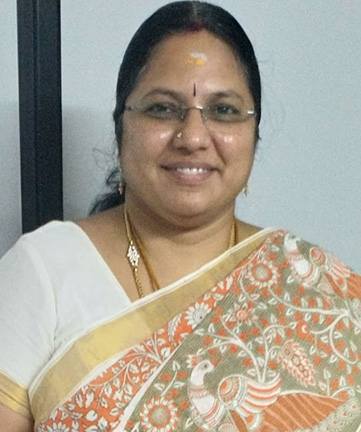
Sangeetha R.G.
For this installment of Senior Member Insights, we talk with Sangeetha R.G. Sangeetha is an associate professor in School of Electronics Engineering (SENSE), Vellore Institute of Technology, Chennai, India where she is carrying out a Department of Science and Technology (DST)–sponsored funded project under the Fast-Track Young Scientist Scheme. She is a recipient of the 2017 “Young Scientist” award from South Indian Association of Scientists, Developers and Faculties. Her main research interests are in fiber optic communications, optical networks, and free-space communication.
What first interested you in pursuing science?
Science and engineering lead to the development of new cutting-edge technologies. Engineering involves applying scientific and mathematical knowledge to design and operate objects, systems and processes to help us solve problems or reach goals. The mere curiosity about the various new technologies and innovations led me toward this field.
What aspect of your current work do you find the most interesting or exciting?
As an associate professor, my job’s nature is twofold: teaching and research. In teaching, I am excited to be among young and dynamic minds. I always emphasize the clear linkages between theoretical concepts and practical applications through appropriate laboratory and field interventions. Also, I prefer to facilitate my lecture sessions to enhance the ability of the students to disaggregate technical challenges and translate them into solvable problems to sharpen their problem solving and analytical ability.
Describe a major turning point in your career. Was there a specific action/accomplishment that got you there?
While pursuing my Ph.D. at Indian Institute of Technology Delhi, India, under the guidance of Prof. Devi Chadha and Prof. Vinod Chandra, I was privileged to commence and shape my interest in optical networks. The able guidance of my professors honed my early understanding of this technological space.
This continues to inspire me to develop my niche research space, which has resulted in a few patents for development of bi-directional data vortex network switches. This has been inspiring me to broad-base my research on complementary applications in addition to bringing in complementary capabilities. Some of this research work has been sponsored under grants from the Science and Engineering Research Board (DST-SERB) programs of the government of India.
I continue to work on evaluating various networks for de-congesting the data-traffic for various practical applications in data centers. I have also been focusing on “green” networks to improve the overall performance of network switches.
What professional resources do you rely on to stay active and engaged with your field?
Conferences, both national and international, tend to be the breeding ground for cross-pollination of ideas. I remain in constant touch with various like-minded researchers who are interested in collaborations. Being a researcher, I have not missed attending the photonics conferences from 2008 onwards, which continues to benefit not just me, but my research team.
Apart from these, I continue to keep myself abreast with the latest developments in the space by volunteering for peer review of publications in addition to spending considerable amount of time in studying various research papers published in leading journals.
What is one piece of advice that you wish you were given as a student/early in your career?
The single most important piece of advice that I wish I was given when I was still a student is not to ignore my field of research at any point of time—irrespective of the various distractions and trends that happen around me during the initial years.
What have you learned by being a mentor to others, and what have you learned from mentors who helped shepherd your career?
Being patient and unearthing the latent talents among my fellow researchers and students, irrespective of their day-to-day academic records, is very important in shaping a good researcher. My mentors employed these two criteria while I was raw and impatient during the early stages of my research career.
What are daily habits that help you to be successful?
Starting the day early in the morning and doing meditation each day helps me to be successful. Being organized and making a to-do list helps me prioritize and declutter my thought process.
At this point in your career, what are you most looking forward to next?
I would like to establish a center of excellence for optical communication at my institute, where I could mentor more researchers and share my knowledge in a streamlined fashion. Also, I would like to translate theoretical concepts into feasible hardware setups that would go a long way in transferring developments to industrial applications.
If you weren’t in the sciences, what would be your dream career?
I would have become a carnatic singer.
